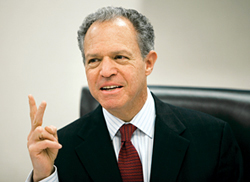In their ongoing battle to wrest orders from the over-the-counter market, officials at the Chicago Board Options Exchange are finding their job has not been made any easier by the near-collapse of the financial system in 2008.

Hoping to leverage fears of counterparty risk brought to light in the meltdown, CBOE officials have been out making calls at insurance companies, pension funds and mutual funds, trying to convince them to avoid the over-the-counter market.
CBOE wants the buyside to ask their brokers to take their trades to the exchanges, rather than another dealer. But tight relationships between the buyside and their dealers, plus a large loophole in the Dodd-Frank Act, have made that a challenge.
"We are trying to educate the end-user customer that they don’t have to accept counterparty risk with a bank," said William Brodsky, chief executive of the CBOE, at a recent press briefing in New York. "But it’s a slow process."
The CBOE has made strides with its Flex product, designed to mimic certain OTC trades, as seen by rising volume in the flexible contracts. But it still must deal with entrenched institutional habits. Dodd-Frank didn’t help either.
As part of the financial reform bill, which partly deals with derivatives trades, lawmakers included the so-called "end-user exemption." That allows the ultimate customer in any OTC derivatives trade to avoid putting up collateral. By contrast, the customer must post the margin in an exchange trade.
The difference has made it harder to sell the buyside on an exchange trade, Brodsky noted. "It’s a very unlevel playing field," he said.




